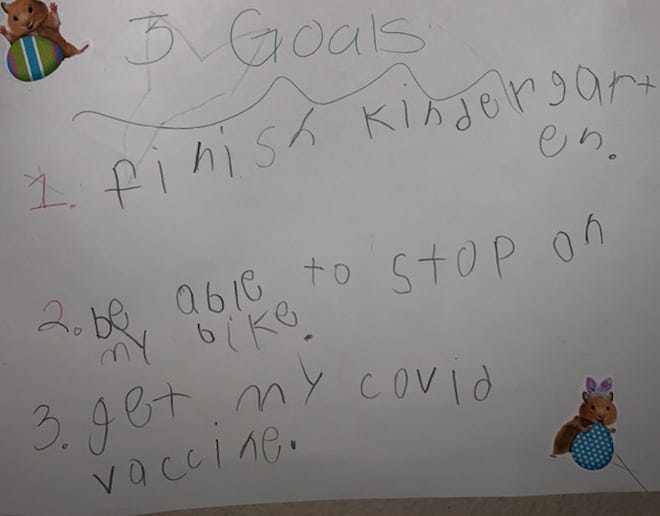
I'm USA TODAY editor-in-chief Nicole Carroll, and this is The Backstory, insights into our biggest stories of the week. If you'd like to get The Backstory in your inbox every week, sign up here.
Chrissie Thompson was stressed out.
She has two kids, ages 3 and 5 months. She and her husband are vaccinated against COVID-19, but kids can't get vaccinated yet. They were trying to make summer plans and wondering what to do when parents are protected but kids are not.
"For instance, a big thing for me was whether it was safe to fly with unvaccinated kids," she said.
"It seemed to me like a lot of the country was reopening and heading into the best summer ever, and families like mine were being left behind."
Julia Thompson worried about taking her kids into stores with unmasked adults. Her 5-year-old put "get my COVID vaccine" on her summer goals list, right after to "learn to stop on my bike."
Michelle Maltais was just looking for guidance for her kids, ages 7 and 10, as her home state California was reopening, "which sends me into hermit mode and my husband ready to rip off masks and dance in the streets."
Chrissie Thompson is USA TODAY's education editor. Julia Thompson and Maltais are editors for Money, Tech and Travel. All were frustrated by the lack of consistent information. "Maybe we can do something about this," Chrissie Thompson thought – and rallied a team to make it happen.
Reporters contacted five medical experts and asked them about 10 scenarios when parents are vaccinated and kids are not. What is the risk on a scale of 1 to 10? This week, they reported the median risk factor for each question.
They asked about everything from swimming in public pools (a lowrisk factor of 3) to sitting in a full movie theater with most not wearing masks (risk factor of 5) to an indoor family reunion where most people are unvaccinated and unmasked (high risk: 9).
"When the expert survey results came back, our team chat exploded with relieved parents saying they were so glad to have some guidance on this or that activity," Chrissie Thompson said. "And I just got off a plane with my two kids – risk factor of 3! (4 for the baby) – so it was such a relief to have some risk info to weigh before that trip."

Some argue that kids rarely get seriously ill from COVID-19, so why all the worry? Children represent 2.2% of hospitalizations (more than 18,500) and 0.07% of total deaths (344). But, parents say, you don't know if that's going to be your child.
"There's no precursor of knowing if you're going to develop severe disease from COVID, if you're going to develop long COVID," said health reporter Adrianna Rodriguez. "You're really just leaving it up to chance. And no parent wants to take that risk if they can avoid it."
Although severe illness due to COVID-19 is rare among children, it's still one of the most deadly pediatric respiratory diseases.
More children are hospitalized for influenza during a normal flu season than for COVID-19. There are 32 to 92 hospitalizations per 100,000 flu cases, compared with 22 hospitalizations per 100,000 COVID-19 cases, Rodriguez reported this week. "There are fewer deaths from the flu. A normal flu season has 110 to 192 influenza deaths in children, whereas more than 300 children have died from COVID-19."
Education reporter Erin Richards points out that children who get the virus (including those with no symptoms) are less likely than adults to spread it, but they still can.
"Viruses want to live and continue to survive," she said. "And so if children are not necessarily getting very sick, but are spreading this variant to moreunvaccinated people, we're basically offering the virus more opportunities to persist and potentially become even more infectious."
And the delta variant is spreading quickly. The U.S. is once again reporting more than 1,000 new coronavirus infections every hour, according to a USA TODAY analysis of Johns Hopkins University data for the week ending Wednesday. (The totals represent only about 10% of the numbers reported in the worst week in January.)
“Because it’s the most highly contagious variant to date based on all the data we’ve accumulated so far, we expect to see more rapid transmission of this virus from adults and adolescents to children,” said Dr. James Versalovic, pathologist-in-chief and interim pediatrician-in-chief at Texas Children’s Hospital.
Indeed, children are making up a larger percentage of all COVID-19 cases.
Overall, children account for 14% (more than 4 million) of cases. But last week, kids made up 22.3% (19,482 out of 87,374) of weekly reported cases, according to data by the American Academy of Pediatrics.
Children are only 16% of the population.

Meanwhile in Tennessee, the state government has dialed back efforts to vaccinate minors against coronavirus.
Health reporter Brett Kelman from the Nashville Tennessean, part of the USA TODAY Network, broke the news Tuesday that the Tennessee Department of Health is stopping all adolescent vaccine outreach – not just for coronavirus, but all diseases – after pressure from Republican state lawmakers.
It removed a flyer from its website and social media that said, "Tennesseans 12+ Eligible for Vaccines. Give COVID-19 vaccines a shot."

The health department ordered its staff to do "no proactive outreach regarding routine vaccines" and "no outreach whatsoever regarding the HPV vaccine," and no pre-planning for flu shot events at schools.
Additionally, the department will no longer send postcards reminding teens to get their second vaccine dose. Instead, cards will be sent to adults so that the reminders are not “potentially interpreted as solicitation to minors." The department will stop COVID-19 vaccine events on school property, including clinics that also vaccinate adults.
Kelman explained how things got to this point.
The rollback started, he said, after state immunization chief Dr. Michelle Fiscus sent a letter to medical providers explaining the state's “Mature Minor Doctrine,” a legal mechanism by which they are allowed to vaccinate minors 14 and above without parents' consent if the teens meet the definition of "mature minor" in Tennessee law. Fiscus was responding to questions from providers. The doctrine was established in 1987 and had been on the health department's website since at least 2008.
The letter, along with the social media flyers, angered conservative lawmakers who erupted at a mid-June hearing, Kelman said. "They brought the Tennessee Department of Health in there and just went after them and accused them of peer pressuring kids and strong arming them into getting vaccinated, circumventing parents."
Even though, he reported, at the June 16 hearing, "Health Commissioner Dr. Lisa Piercey said to her knowledge the doctrine had only been invoked eight times this year. Three of those instances involved her own kids, who were vaccinated while she was at work."

After that hearing, Kelman said, the health department "began to very quietly roll some stuff back, first they deleted some Twitter posts and Facebook flyers that they knew the lawmakers had seen. Because they had actually held them up during the hearing as examples of peer pressure."
Immunization chief Fiscus was fired. "I have been terminated for doing my job because some of our politicians have bought into the anti-vaccine misinformation campaign rather than taking the time to speak with the medical experts," she wrote in a statement.
There has been national backlash to the rollback. What do the lawmakers who started it say? Kelman says they aren't talking.
And how is Tennessee (38% fully vaccinated) doing? Its rate of infections has tripled in the past three weeks – one of the largest increases in the US.
More:The Backstory: What our reporters saw, heard and experienced at the Florida condo collapse
Nicole Carroll is the editor-in-chief of USA TODAY. Reach her at [email protected] or follow her on Twitter here. Thank you for supporting our journalism. You can subscribe here.









